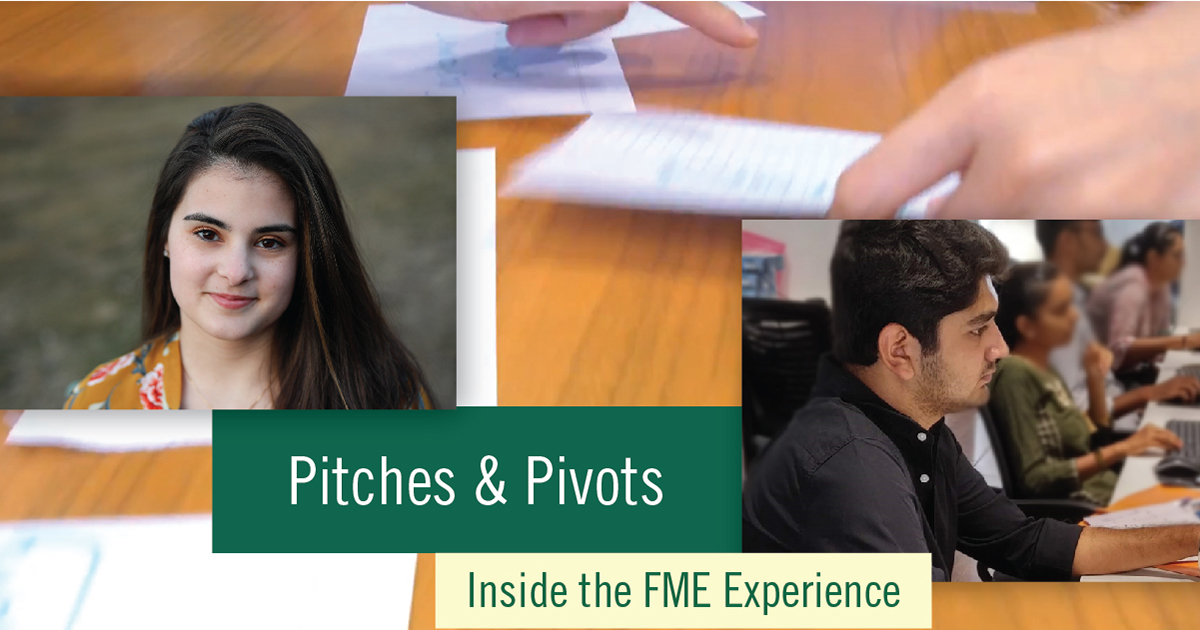A Babson Rite of Passage Begins

This is the first installment of an ongoing series about first-year students’ journey through the Foundations of Management and Entrepreneurship (FME) course.
Entering Babson as a first-year student, Sophia Pantos ’24 admits that she didn’t know anything about the Foundations of Management and Entrepreneurship course, better known as FME.
“I didn’t understand what it was,” Pantos says. “I just thought it was a theoretical course.” She figured the professor would lecture, the students would take notes, and then they would be given tests. Just a standard course, she thought, nothing unusual.
She soon discovered, however, that FME is anything but standard or usual.

A requirement for all first-year students at Babson, the course takes participants on a business journey, where they dream up ideas for ventures and then make them into reality. Along the way, they cover everything needed to make a business run: marketing, accounting, information systems, operations, organizational behavior. More than that, they practice teamwork, entrepreneurial leadership, and the foresight to identity opportunities and the resilience to pursue them.
In short, it is definitely not a typical lecture and test-taking exercise. “It puts everything into this crazy course on entrepreneurship,” Pantos says. “It introduces you to what business and Babson are all about.”
As part of an ongoing series, we’re taking a look at the FME experience, from the pitches and presentations to the pivots and products. FME makes for a long, riveting ride through the school year, and we’ll follow students as they launch their ventures, seek customers, and make discoveries about business and about themselves.
The World Is the Customer
A hallmark of Babson, FME has been a rite of passage for a generation of undergraduates. For years, the sight of student companies selling their products has been a ubiquitous part of College life.
“It’s been a flagship course at Babson for a quarter of a century,” says James Hunt, associate professor of management, who has long taught FME classes. “Of course, it has changed over time, but the core teaching method, of getting students actually creating and running a business, still rules.”
FME students spend the first half of the school year exploring and developing business ideas before launching their ventures in the second half. In the past, student businesses often sold physical products such as water bottles, T-shirts, and phone cases. This year, however, professors are pushing students to think beyond those usual ideas. “They weren’t unique products, and the primary market they sold to was their fellow Babson students, and that’s a little too easy,” says Bill LaPoint, senior lecturer in entrepreneurship and co-coordinator of FME.
“It puts everything into this crazy course on entrepreneurship. It introduces you to what business and Babson are all about.”
Sophia Pantos ’24
Because of the pandemic, students won’t be able to sell face to face on campus this year, but that’s not a problem in a world where so much happens online. “This forces them to think more broadly,” LaPoint says. “It means the whole world is their customer.”
The pandemic also means another significant change this year, with students participating in classes that are either hybrid (with students alternating between classroom and online instruction) or fully online. Pantos participates in her FME class from her home in Portsmouth, Rhode Island. Arya Patel ’24 is living on campus after traveling from his home in Rajkot, India, but he also has opted to take his FME course fully online.
“The way Babson has done all the technology, it’s easy to settle in online,” Patel says. “It’s pretty smooth.”
The Power of Team
As they began the FME in the very first weeks of the semester, both Patel and Pantos came away with strong first impressions. Patel was surprised by how effective and useful the entrepreneurial mindset displayed in the course can be. “It’s a way of thinking,” he says. “You can incorporate it into all aspects of your life.”
He also was struck by how much teamwork is involved. Early in the course, students are placed into teams, and they continue to work in groups throughout the school year. Patel’s team in the semester’s first weeks included two students from China and another from India. “If you have a team of diverse people,” he says, “they bring different perspectives to the table.”
Pantos’ team included students from California, Miami, and Brazil, and they usually talked every day. The group grew close, and Pantos was amazed by what they could accomplish, how their thoughts and proposals would build upon each other. “Someone has an idea, and everyone collaborates and works together and you create something that you did not think was possible,” she says.
In the weeks to come in FME, that power of a team working together would serve Patel and Pantos well. “This class would not be possible if you were creating something by yourself,” Pantos says. “I am only as great as the group.”
Pitches and Pivots: Our FME series
Part 1: A Babson Rite of Passage Begins (above)
Part 2: Think Big, Observe, and Create Solutions
Part 3: 3 Minutes, 3 Slides, and the Fate of a Business Idea
Part 4: Preparing for Launch: It’s All About Manufacturing
Part 5: Product Problems, Inventory Issues, and Mailing Mishaps
Part 6: The Final Ledger: Closing Time in FME
Posted in Community





